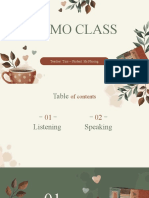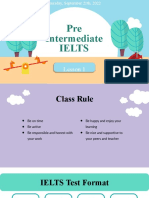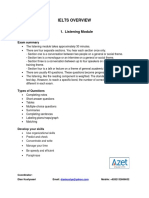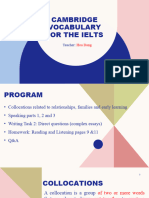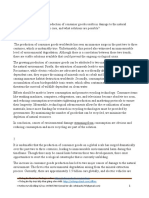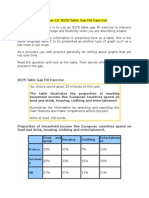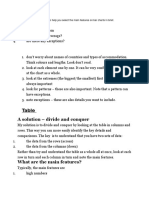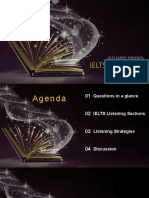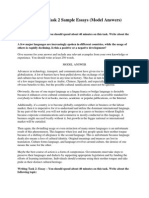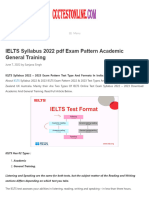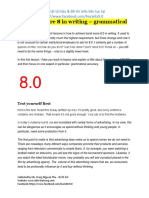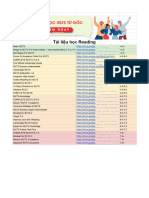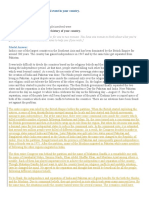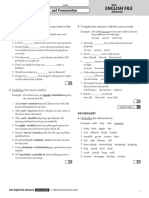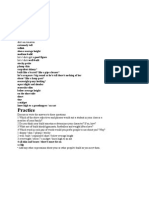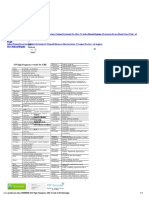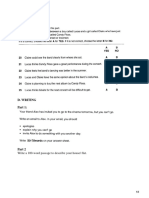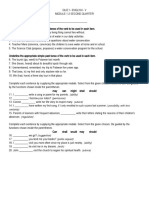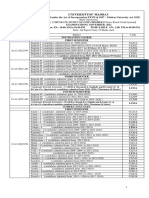0 ratings0% found this document useful (0 votes)
116 viewsIelts Speaking Task 2 Checklist
Ielts Speaking Task 2 Checklist
Uploaded by
Brenda Agostina BertoldiThe document provides checklists for IELTS Speaking Parts 1, 2, and 3. Each part lists 10-13 questions to self-assess performance in areas like paraphrasing questions, developing answers with reasons and examples, avoiding repetition, using a range of grammar and vocabulary, speaking clearly at an appropriate pace and rhythm, and focusing on fluency over accuracy (where applicable). Part 1 is meant to be personal rather than abstract, while Part 3 requires more abstract answers.
Copyright:
© All Rights Reserved
Available Formats
Download as PDF, TXT or read online from Scribd
Ielts Speaking Task 2 Checklist
Ielts Speaking Task 2 Checklist
Uploaded by
Brenda Agostina Bertoldi0 ratings0% found this document useful (0 votes)
116 views1 pageThe document provides checklists for IELTS Speaking Parts 1, 2, and 3. Each part lists 10-13 questions to self-assess performance in areas like paraphrasing questions, developing answers with reasons and examples, avoiding repetition, using a range of grammar and vocabulary, speaking clearly at an appropriate pace and rhythm, and focusing on fluency over accuracy (where applicable). Part 1 is meant to be personal rather than abstract, while Part 3 requires more abstract answers.
Copyright
© © All Rights Reserved
Available Formats
PDF, TXT or read online from Scribd
Share this document
Did you find this document useful?
Is this content inappropriate?
The document provides checklists for IELTS Speaking Parts 1, 2, and 3. Each part lists 10-13 questions to self-assess performance in areas like paraphrasing questions, developing answers with reasons and examples, avoiding repetition, using a range of grammar and vocabulary, speaking clearly at an appropriate pace and rhythm, and focusing on fluency over accuracy (where applicable). Part 1 is meant to be personal rather than abstract, while Part 3 requires more abstract answers.
Copyright:
© All Rights Reserved
Available Formats
Download as PDF, TXT or read online from Scribd
Download as pdf or txt
0 ratings0% found this document useful (0 votes)
116 views1 pageIelts Speaking Task 2 Checklist
Ielts Speaking Task 2 Checklist
Uploaded by
Brenda Agostina BertoldiThe document provides checklists for IELTS Speaking Parts 1, 2, and 3. Each part lists 10-13 questions to self-assess performance in areas like paraphrasing questions, developing answers with reasons and examples, avoiding repetition, using a range of grammar and vocabulary, speaking clearly at an appropriate pace and rhythm, and focusing on fluency over accuracy (where applicable). Part 1 is meant to be personal rather than abstract, while Part 3 requires more abstract answers.
Copyright:
© All Rights Reserved
Available Formats
Download as PDF, TXT or read online from Scribd
Download as pdf or txt
You are on page 1of 1
Ready for Speaking
IELTS Speaking checklists
IELTS Speaking Part 1 IELTS Speaking Part 3
See the checklist for Part 3. 1 Did you paraphrase the question?
1 Did you paraphrase the question? 2 Was your answer organised?
2 Did you develop your answer by giving simple 3 Did you develop your answer by giving
reasons? reasons and examples?
3 Were your ideas relevant to the question? 4 Did you also develop your ideas by expressing
contrasts, causes, effects, purposes and
4 Did you avoid repetition of words and
conclusions?
structures?
5 Did you use a range of grammar, vocabulary
s Was your answer abstract as required or was
it too personal?
and complex structures?
6 Were your ideas relevant to"the question?
6 Did you concentrate too much on accuracy
rather than fluency? 7 Did you avoid repetition of words and
structures?
7 Did you speak clearly?
8 Did you use a range of gram{Tlar, vocabulary
8 Did you speak too quickly or slowly? and complex structures?
9 Did you speak using the correct rhythm or 9 Did you concentrate too much on accuracy
sentence stress? rather than fluency?
10 Did you use the correct word/phrase stress?
10 Did you speak clearly?
Remember this section is personal not abstract. 11 Did you speak too quickly or slowly?
12 Did you speak using the correct rhythm or
sentence stress?
IELTS Speaking Part 2 13 Did you use the correct word/phrase stress?
See checklist for Part 3 and 1-5 below.
1 Did you make notes?
2 Were your notes short-no more than about
ten words?
3 Did you answer all the parts of the question
in order?
4 Did you refer to your notes as you spoke?
5 Were your notes easy to glance at as you
spoke?
181
You might also like
- Deep Magic 2 Vol 2Document289 pagesDeep Magic 2 Vol 2Edinaldo Coxinha100% (6)
- IELTS Practice Test 9Document21 pagesIELTS Practice Test 9Nakbus Nugroho100% (1)
- IELTS Writing Band Descriptors: Task 2Document1 pageIELTS Writing Band Descriptors: Task 2Vebriany PurnamasariNo ratings yet
- IELTS Writing 1-2 TestDocument2 pagesIELTS Writing 1-2 TestInga Elena100% (1)
- IELTS Speaking Made Easy: Techniques for Univeristy Graduates, Professionals, and ESL StudentsFrom EverandIELTS Speaking Made Easy: Techniques for Univeristy Graduates, Professionals, and ESL StudentsNo ratings yet
- IELTS Essay Writing TIPSDocument5 pagesIELTS Essay Writing TIPSMichelle Seno Son GonzalesNo ratings yet
- Ielts Essay 8.0Document2 pagesIelts Essay 8.0Dâu TâyNo ratings yet
- Ielts Writing - Coherence CohesionDocument1 pageIelts Writing - Coherence CohesionNindia Ayu FaridshaNo ratings yet
- IELTS Corner Sept 17 2020Document6 pagesIELTS Corner Sept 17 2020Professor WinnNo ratings yet
- IELTS - Essay Writing Task 2Document9 pagesIELTS - Essay Writing Task 2Kashif HussainNo ratings yet
- Demo Class IELTSDocument18 pagesDemo Class IELTSNgân Anh Lâm NgọcNo ratings yet
- PART 3 Speaking LingoDocument34 pagesPART 3 Speaking LingoTrang NguyenNo ratings yet
- PI Lesson 1Document49 pagesPI Lesson 1Linh Le Thi ThuyNo ratings yet
- Tổng Hợp Full Ngân Hàng Đề Thi Ielts WritingDocument318 pagesTổng Hợp Full Ngân Hàng Đề Thi Ielts Writingvitaminbiii102No ratings yet
- Ielts Handbook - Theory PDFDocument102 pagesIelts Handbook - Theory PDFBao TranNo ratings yet
- IELTS HIGHER GeneralTraining Practice Test 01 PDFDocument49 pagesIELTS HIGHER GeneralTraining Practice Test 01 PDFhhhumNo ratings yet
- Products Ielts Speaking Part 2 3 British English StudentDocument3 pagesProducts Ielts Speaking Part 2 3 British English Studentcarlosrom9610No ratings yet
- Passive Voice - Ielts and InversionDocument4 pagesPassive Voice - Ielts and InversionJoseMa Aral100% (1)
- PI Lesson 2 RevisedDocument38 pagesPI Lesson 2 RevisedLinh Le Thi ThuyNo ratings yet
- Theory and Exercise WRITING TASK 2Document21 pagesTheory and Exercise WRITING TASK 2thnvystarnaNo ratings yet
- IELTS Speaking Part 2 QuestionsDocument1 pageIELTS Speaking Part 2 QuestionsCaitlinNo ratings yet
- Ielts Test Schedule 2010Document1 pageIelts Test Schedule 2010hmphuong248No ratings yet
- IELTS Task 1 Vocab PrepositionsDocument2 pagesIELTS Task 1 Vocab PrepositionsSabrina SanchezNo ratings yet
- IELTS CollocationDocument4 pagesIELTS CollocationGps7676No ratings yet
- Writing IeltsDocument17 pagesWriting IeltsThục Mỹ100% (2)
- IELTS Speaking Part 2Document5 pagesIELTS Speaking Part 2Will Go NalamNo ratings yet
- IELTS Overview-AZET Language Centre-2Document5 pagesIELTS Overview-AZET Language Centre-2dianNo ratings yet
- Vocabulary For The IELTSDocument76 pagesVocabulary For The IELTSHoa huynh hoaNo ratings yet
- Ielts SPK PracticeDocument29 pagesIelts SPK PracticeShayne DomingoNo ratings yet
- SÁCH LUYỆN THI IELTS WRITING 2022 - 2023 BY NGOCBACHDocument29 pagesSÁCH LUYỆN THI IELTS WRITING 2022 - 2023 BY NGOCBACHAnh Tú NguyễnNo ratings yet
- (HTTP://WWW - Ieltstutor.me/) - IELTS Vocabulary - Band 8.0 - Topic - UrbanizationDocument6 pages(HTTP://WWW - Ieltstutor.me/) - IELTS Vocabulary - Band 8.0 - Topic - UrbanizationTUTOR IELTS100% (2)
- IELTS Band Descriptors Task 1Document2 pagesIELTS Band Descriptors Task 1Alejandro RodriguezNo ratings yet
- Writing TemplateDocument4 pagesWriting TemplateHoàng VânNo ratings yet
- Pie ChartDocument1 pagePie Chartbhimani darshan100% (1)
- Summarize The Information by Selecting and Reporting The Main Features and Make Comparisons Where RelevantDocument3 pagesSummarize The Information by Selecting and Reporting The Main Features and Make Comparisons Where RelevantHojatollah IzadiNo ratings yet
- IELTS Tables DescribedDocument4 pagesIELTS Tables DescribedUnnatiNo ratings yet
- IELTS Speaking Handout - ACDocument12 pagesIELTS Speaking Handout - ACAngela BravoNo ratings yet
- IELTS Listening - StrategyDocument23 pagesIELTS Listening - StrategyilmiNo ratings yet
- IELTS Writing Task 2Document7 pagesIELTS Writing Task 2Souvik DasNo ratings yet
- Ielts Academic Writing Task 2 Animal TraffickingDocument1 pageIelts Academic Writing Task 2 Animal Traffickingpoiu0987No ratings yet
- Subject-Verb Agreement RulesDocument16 pagesSubject-Verb Agreement Rulesyeniffer espinozaNo ratings yet
- Ielts EssayDocument10 pagesIelts EssaySirosh AntonyNo ratings yet
- 5.2 IELTS Band 9 Model Answers Extent Pay TaxesDocument2 pages5.2 IELTS Band 9 Model Answers Extent Pay Taxeshannah sonjaNo ratings yet
- Ielts Speaking Part 3Document47 pagesIelts Speaking Part 3Lê Thu NguyetNo ratings yet
- Tips For Ielts Speaking Part 2Document5 pagesTips For Ielts Speaking Part 2Miranda KeikuNo ratings yet
- IELTS Writing Task-2Document6 pagesIELTS Writing Task-2Guru ChaudhariNo ratings yet
- Ielts Task 2 Writing Band DescriptorsDocument2 pagesIelts Task 2 Writing Band DescriptorsAnh NguyễnNo ratings yet
- IELTS Syllabus 2022 PDF Exam Pattern Academic General TrainingDocument37 pagesIELTS Syllabus 2022 PDF Exam Pattern Academic General TrainingMehrab ShawonNo ratings yet
- Band Score 8 in Writing - Dominic Cole PDFDocument16 pagesBand Score 8 in Writing - Dominic Cole PDFminh thaoNo ratings yet
- Part 1 Speaking TopicsDocument121 pagesPart 1 Speaking TopicsThúy Hà NguyễnNo ratings yet
- IELTS Speaking Study Planner May-August 2024Document2 pagesIELTS Speaking Study Planner May-August 2024Har NoorNo ratings yet
- Ielts Speaking HomeworkDocument8 pagesIelts Speaking Homeworkcqxxvzhlf100% (1)
- IELTS Advantage Listening TestDocument4 pagesIELTS Advantage Listening TestaseelisamNo ratings yet
- Open Day Presentation - Part 3 SpeakingDocument31 pagesOpen Day Presentation - Part 3 SpeakingSaigon EnglishNo ratings yet
- 3 Đề Thi Speaking Ra Nhieu Nhat - ielts Ngoc BachDocument6 pages3 Đề Thi Speaking Ra Nhieu Nhat - ielts Ngoc BachNguyễn Công LýNo ratings yet
- Courseguide Sophomore IELTS 4.0Document4 pagesCourseguide Sophomore IELTS 4.0Hoàng Toại Cao VõNo ratings yet
- Education by LizDocument16 pagesEducation by LiznigarNo ratings yet
- T NG H P PDF Sách IELTS Reading SDDocument1 pageT NG H P PDF Sách IELTS Reading SDPhương Anh NguyễnNo ratings yet
- Slide 2 - Writing Task 1 - Criteria and StructureDocument6 pagesSlide 2 - Writing Task 1 - Criteria and StructurePhương Ngọc PeenNo ratings yet
- Cue Cards Ielts-1Document272 pagesCue Cards Ielts-1MidhunBhuvaneshB RWSNo ratings yet
- Mastering IELTS: A Practical Approach for Non-Native SpeakersFrom EverandMastering IELTS: A Practical Approach for Non-Native SpeakersNo ratings yet
- IE Vhi Dental Table of Benefits JAN2024 enDocument3 pagesIE Vhi Dental Table of Benefits JAN2024 enBrenda Agostina BertoldiNo ratings yet
- Do Blondes Have More Fun British English StudentDocument8 pagesDo Blondes Have More Fun British English StudentBrenda Agostina BertoldiNo ratings yet
- Jamie OliverDocument2 pagesJamie OliverBrenda Agostina BertoldiNo ratings yet
- AlligatorsDocument2 pagesAlligatorsBrenda Agostina BertoldiNo ratings yet
- PG 61Document1 pagePG 61Brenda Agostina BertoldiNo ratings yet
- WeddingsDocument2 pagesWeddingsBrenda Agostina BertoldiNo ratings yet
- Friday Test Grammar: 2. Must Can'TDocument3 pagesFriday Test Grammar: 2. Must Can'TBrenda Agostina BertoldiNo ratings yet
- c1 PM Advanced Nef Unit 5aDocument6 pagesc1 PM Advanced Nef Unit 5aBrenda Agostina BertoldiNo ratings yet
- C1PM Slides PDF TuesdayDocument30 pagesC1PM Slides PDF TuesdayBrenda Agostina BertoldiNo ratings yet
- C1 File Test 3Document4 pagesC1 File Test 3Brenda Agostina BertoldiNo ratings yet
- C1PM Test 8 JulyDocument4 pagesC1PM Test 8 JulyBrenda Agostina BertoldiNo ratings yet
- C1PM Week 12 4 July - Slides PDFDocument24 pagesC1PM Week 12 4 July - Slides PDFBrenda Agostina BertoldiNo ratings yet
- Friday Test June 10Document4 pagesFriday Test June 10Brenda Agostina BertoldiNo ratings yet
- Week 6 NEF Adv Unit 1BDocument6 pagesWeek 6 NEF Adv Unit 1BBrenda Agostina BertoldiNo ratings yet
- Friday Test - c1 - 73%Document3 pagesFriday Test - c1 - 73%Brenda Agostina BertoldiNo ratings yet
- c1 PM Nef Unit 2aDocument5 pagesc1 PM Nef Unit 2aBrenda Agostina BertoldiNo ratings yet
- English Tenses: Present Simple Present Continuous Present ProgressiveDocument2 pagesEnglish Tenses: Present Simple Present Continuous Present ProgressiveBrenda Agostina BertoldiNo ratings yet
- Memorator EnglezaDocument41 pagesMemorator EnglezaPaula HultoanaNo ratings yet
- CP B. Indonesia Fase DDocument2 pagesCP B. Indonesia Fase Dharomaini46No ratings yet
- West Bengal PDFDocument520 pagesWest Bengal PDFabhishekNo ratings yet
- Guía Inglés Present PerfectDocument5 pagesGuía Inglés Present PerfectJUAN SEBASTIAN SILVA CHACÓNNo ratings yet
- Past Tenses TestDocument2 pagesPast Tenses TestKarina Ecay100% (1)
- Speakout Pronunciation Extra Elementary With Key PDFDocument20 pagesSpeakout Pronunciation Extra Elementary With Key PDFTatiana Guschinskaya100% (1)
- vt59.2708-2111392495 976412795715098 1324507469 n.pdfReading-Challenge-3-Second-Edition - PDF NC Cat 111 PDFDocument130 pagesvt59.2708-2111392495 976412795715098 1324507469 n.pdfReading-Challenge-3-Second-Edition - PDF NC Cat 111 PDFTekla TeklaNo ratings yet
- IoT Developer Program OverviewDocument36 pagesIoT Developer Program Overviewmrlamb711No ratings yet
- Sobre Nicolás Gómez DávilaDocument4 pagesSobre Nicolás Gómez DávilaDiego GarridoNo ratings yet
- Isidore of Seville and The EtymologiesDocument26 pagesIsidore of Seville and The EtymologiesBurcu UzunoğluNo ratings yet
- Active VoiceDocument3 pagesActive VoiceeyemanNo ratings yet
- 7 1 DBA Tools With IBM I NavigatorDocument85 pages7 1 DBA Tools With IBM I NavigatorPanzo Vézua Garcia0% (1)
- English SbaDocument9 pagesEnglish SbaCamillo CurtisNo ratings yet
- HTML CSS JavaScript BasicsDocument225 pagesHTML CSS JavaScript BasicsSuhendrahNo ratings yet
- Eng8 LAS Q3M4W4Document4 pagesEng8 LAS Q3M4W4Guiann Hope NecorNo ratings yet
- VocabularyDocument7 pagesVocabularyRose YukiNo ratings yet
- Exercises With Present Perfect SimpleDocument7 pagesExercises With Present Perfect SimpleEUNICE CHRISTINE MANOENo ratings yet
- 333 High Frequency GRE Words With MeaningsDocument7 pages333 High Frequency GRE Words With MeaningsAmareshwar BitraguntaNo ratings yet
- 79 Grammar. Passive Present SimpleDocument1 page79 Grammar. Passive Present SimpleLydra AliajNo ratings yet
- Practice Test 6 PETDocument12 pagesPractice Test 6 PETPhi Long Lý TrầnNo ratings yet
- Analysis Textbook of Sma X Bab 1Document17 pagesAnalysis Textbook of Sma X Bab 1Alffa RizNo ratings yet
- Relative PronounsDocument2 pagesRelative PronounsCarmen Nebreda QuintanaNo ratings yet
- Aop 24532563 0705 en PDFDocument36 pagesAop 24532563 0705 en PDFIgor MiladinovicNo ratings yet
- QUIZ 1engDocument2 pagesQUIZ 1engkimkimNo ratings yet
- Workshop SolutionsDocument46 pagesWorkshop SolutionsfrendzssmileNo ratings yet
- BCOMCSDocument7 pagesBCOMCShmeet8041No ratings yet
- Unusual Jobs British English TeacherDocument8 pagesUnusual Jobs British English Teacherpetrukha.nataliaNo ratings yet
- Simple SentencesDocument5 pagesSimple SentencesJessica MarieNo ratings yet
- Questioned Documents Definition of TermsDocument11 pagesQuestioned Documents Definition of TermsMark Bryan CruzNo ratings yet










